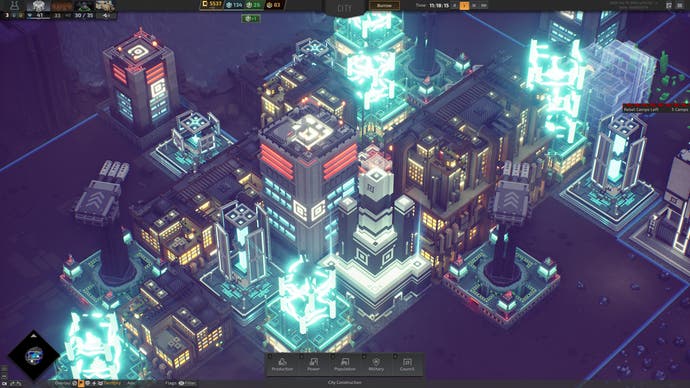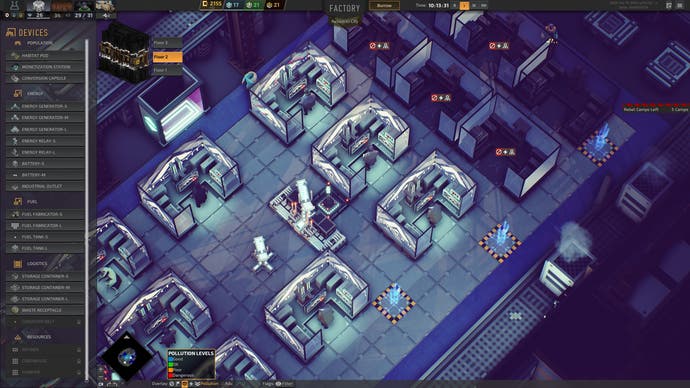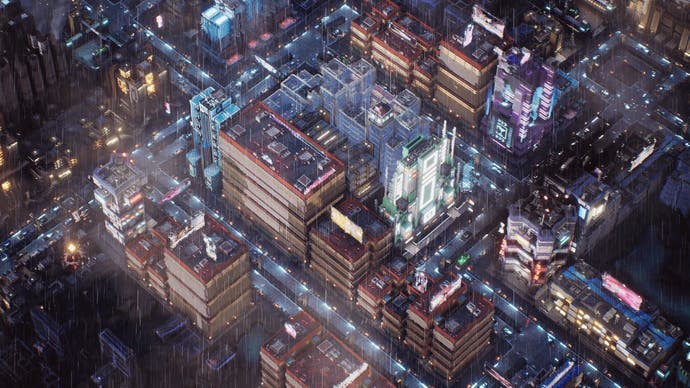Industries of Titan has the potential to be one of the great management games
Night city.
I'm not sure what's worse, that I can't figure out why my Citizens keep dying, or that I don't especially care. My smokestacks are at least partially responsible, belching out toxic fumes as they burn the waste littering the surface of Titan like crisp packets across the Pacific. Building my habitation pods next to factory equipment probably isn't helping either. Sleep and industrial machinery are not natural bedfellows.
It's a combination of factors that would take significant effort to resolve. I could do that, or I can just keep buying shiploads of fresh citizens from my spaceport. They're remarkably cheap, after all.
Industries of Titan may look like SimCity in Space, but it plays more like a hyper-capitalist Dungeon Keeper, one where being evil isn't so much a performative pantomime as just a necessary cost of operations. You play the head of a freshly minted corporation chosen to oversee a new and lucrative business venture on Saturn's largest moon. Expectations are high, and you'll need to exploit every resource at your disposal to make your mark on this alien world.

It's important to clarify at the door that Industries of Titan is very Early Access. On launch, the game immediately confronts you with a detailed roadmap of upcoming features, of which there are many. This includes core mechanics you might have seen in trailers, such as ship construction and combat. What you're paying for, essentially, is a limited foundation of what the game will eventually become.
The good news is that the foundation is strong. Your arrival on Titan isn't onto virgin soil. A whole other civilisation has come and gone before you were a twinkle in the universe's eye, leaving behind a black metropolis of ancient, derelict skyscrapers. Pulling these down provides you with the basic resources needed to erect your own neon-soaked cityscape, as well as succinctly demonstrating capitalism's ability to conflate the words "warning" and "opportunity".
Constructing factories is only the start of your business endeavour. Your city runs on a complex infrastructure that is satisfying to grapple with. Most buildings require energy generated by burning fuel, which in turn is synthesised from Titan's methane-rich atmosphere by special machines. Energy must also be distributed both inside and outside your factories via pylons. Yes, you can build objects and equipment inside your factories in Industries of Titan.
All these tasks are performed by obedient "Employees", as well as other duties like ferrying resources from point-to-point. Employees are distinct from Citizens, who are treated more like battery hens, cooped up in tiny accommodation pods and forced to watch credit-generating advertisements in special booths. Locate a Red Artefact in one of those ancient skyscrapers, and you can convert Citizens into Employees using a special machine. The process by which this is done is only vaguely alluded to, but it seems to involve the subject vomiting up all their internal organs (Stomachs are not especially cost-efficient when you think about it).
I love Titan's grimy, rain-slicked aesthetic, while the buzzy synth soundtrack captures that low-Cyberpunk theme the game is clearly shooting for. The building designs are extraordinarily detailed too, right down to the lights flickering on when power is connected. Most importantly, the underlying simulation is robust and well-explicated - you can identify what every Employee is doing by sight, and adjusting the order queue for assignments makes a noticeable difference in how they act.

Once you've established a basic operation, however, there's not a huge amount to encourage expansion. Rebel ships will occasionally turn up to spoil your day, and there's a loose broader objective of eliminating five enemy camps, but the game is clearly lacking those key features listed in the roadmap to make long-term play engaging.
I also hope Titan doesn't go too overboard in its parodying of cyberpunk megacorps, parroting the shallow zaniness of games like The Outer Worlds and Journey to the Savage Planet. Elements like the advertisement pods lean in this direction, but Titan is much more interesting when it lets you be the architect of those oppressive structures, making banal decisions which have terrible consequences three or four steps down the line. That's where the thematic power of a good management game lies, and even in this relatively basic form, Industries of Titan has got the potential to be one of the best.


